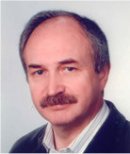|
|
Plenary Lecture
The Material Point Method in Large Strain Problems

Professor Zdzislaw Wieckowski
Technical University of Lodz
Chair of Mechanics of Materials
Al. Politechniki 6
90-924 Lodz, Poland
E-mail: zwi@p.lodz.pl
Abstract:
Large strain problems of mechanics
like plastic forming or granular flow problems are still difficult to
solve although many well-developed computational techniques are
available. Some of these techniques are not efficient in the case of
problems where large strains appear. For example, the finite element
method when formulated in the pure Lagrangian format fails due to large
distortions of the element mesh used. On the other hand, the finite
element method is not effective in the case of free surface problems
when formulated in the purely Eulerian format. Point-based methods, also
known as meshless methods, which have been intensely studied recently,
can handle problems with large strains efficiently. Among other
point-based methods, the material point method (MPM), shows its
effectiveness in analyses of large strain problems. The material point
method can be regarded as an arbitrary Lagrangian-Eulerian (ALE)
formulation of the finite element method. The computational element mesh
of the Eulerian type used in MPM can be defined in an arbitrary way
which means that the problem of excessive mesh distortions is avoided.
The results of analyses related to problems of plastic forming,
geomechanics and granular flow will be shown.
Brief Biography of the Speaker:
Address: Chair of Mechanics of Materials, Technical University of
Lodz, Al. Politechniki 6, 90-924 Lodz, Poland, e-mail: zwi@p.lodz.pl.
Education:
1974-1979: Technical University of Lodz, Department of Civil and
Architectural Engineering, M.Sc. in civil engineering.
1987: Ph.D. Thesis: Duality in finite element method and its
applications to some linear and non-linear problems of mechanics of
composite materials, Technical University of Lodz.
2000: Dr.Sc. Thesis (Habilitation Thesis): Application of the finite
element method to some non-linear problems of solid mechanics. Technical
University of Lodz.
Professional experience:
1979-2009: Technical University of Lodz, Lodz, Poland. Current position:
Associate Professor, Head of Chair of Mechanics of Materials, Technical
University of Lodz, Poland.
1992-1994: Visiting Researcher, Division of Structural Mechanics, Lulea
University of Technology, Lulea, Sweden.
1997-1998: Post-doctoral Fellow, Department of Mechanical Engineering,
Korea Advanced Institute of Science and Technology, Daejon, Republic of
Korea.
09-10.2004: Visiting Professor, Department of Mechanical Engineering,
Korea Advanced Institute of Science and Technology, Daejon, Republic of
Korea.
2006-2008: Visiting Professor, several 3-week visits, Institute of
Geotechnical Engineering, University of Stuttgart, Germany.
Research areas:
Computational methods in mechanics especially the finite element method;
equilibrium model of the finite element method; material point method
(arbitrary Lagrangian-Eulerian formulation of the finite element
method); theory of plasticity and viscoplasticity; mechanics of
composite materials; finite element modelling of motion of granular
material in a silo; large strain engineering problems; a posteriori
error estimation for approximate solutions to boundary value problems of
mechanics; gradient and stress fields recovery.
|
|
|